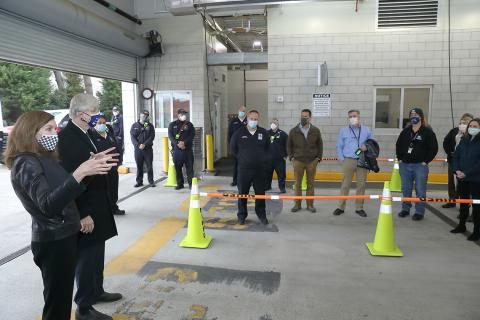Director Thanks Car-Line Employees
ORS’s Taylor Lauded for Work Ethic

Photo: Chia-Chi Charlie Chang
In a normal year, Rodney Taylor works a regular daily schedule. Like most folks, he takes a vacation here and there and has the occasional day off. Of course, once the novel coronavirus outbreak morphed into a historic worldwide pandemic, 2020 wasn’t a normal year for anyone. Taylor, though, took the past year to next-level extraordinary: Staffing the on-campus car line for Covid-19 testing, he has missed only 2 work days since Mar. 18, 2020.

Photo: Chia-Chi Charlie Chang
“June 30 and July 6—before you ask, let me tell you about those 2 days,” he says, laughing.
On Mar. 17, 2021, NIH director Dr. Francis Collins marked the 1-year anniversary of the testing operation with an appreciation ceremony at the site.
“What we did, we made contact with everybody who had something to do with it throughout the whole year,” Taylor explained. “It was kind of like a reunion.”
Some 40 employees converged on the NIH Gateway Center, where the testing operation recently relocated from its original site at the driveway leading to the Lister Hill Center, Bldg. 38A. Workers were praised for their efficiency, professionalism, dedication and commitment to the goals of the facility, amid unprecedented circumstances.
“Dr. Collins said he just wanted to come and see what the workers do,” Taylor recalled. “He actually walked over to each person individually and talked to them and thanked them.”

Photo: Chia-Chi Charlie Chang
Collins had visited the site previously—but as a client, in his car, to be swabbed for Covid-19. For the anniversary event, he was led on a guided tour of the operation with ORS Director Colleen McGowan and Assistant Fire Chief Mike Gilroy.
Drive-up testing at NIH has run continuously since it was established; from March until Memorial Day weekend 2020, it operated 7 days a week. And Taylor was there for all of it.
“It was like going on a deployment for a whole year,” said Taylor, an Armed Forces veteran. “I enjoyed working and I want to say thank you to the health information management team, the [Division of Occupational Health and Safety], the Fire Department and Emergency Management, because those were the four teams put together to make all this happen.”
The testing operation has five general areas: safety, greeters, swabbers, communications and labelers. Taylor’s job doesn’t fit easily into any of those categories.
“I’m the runner,” he explained. Every morning, Taylor checks in at health information management headquarters on the B-1 level of Bldg. 10. There he collects the roster of people signed up to be tested and the swabs, solution vials and other test kit equipment. Then, he heads to the Children’s Inn, where he drops off a portion of the kits designated for inn needs, and finally sets off for the Gateway Center site.
Throughout the day, variations of this route may be repeated several times until, at day’s end, he collects the completed kits for final drop-off at a Clinical Center lab for evaluation.

Photo: Chia-Chi Charlie Chang
“Rodney has been so dedicated to anything he does and it really showed up when we asked him if he would help with the symptomatic testing site,” said Tim Tosten, associate director of program and employee services. “His willingness to do anything has been remarkable, and he shows up every day with a smile—no matter what he has to do.”
Before the pandemic, Taylor worked as a program specialist for food and retail in the ORS Division of Amenities and Transportation Services. His group was responsible for monitoring edibles and other items provided in all the cafeterias, snack bars, concession stands and vending machines for the main campus, Rockledge and Fishers Lane buildings in Bethesda as well as NIH’s Bayview facilities in Baltimore.

Before coming to NIH 5 years ago in February 2016, he worked for the Department of Defense after retiring from military service in 2006. So, he’s accustomed to complex logistical operations that move at a fast pace.
As for the only 2 work days in the past year that he was not at work? He still came on site.
On June 30, he and several other front-line staff were asked to report for testing themselves; he was swabbed that morning and given the required rest of the day off. He was back at work the next morning.
By that evening, however, he was told to quarantine for 21 days as his initial test results came up positive for Covid. Testing was halted anyway, for the Independence Day weekend, and Taylor stayed home until Sunday afternoon. That’s when he was called with news that the first results had been contaminated. Would he come in for a new test? After arriving on site for the test July 6 and getting the results that cleared him for work, he was back on duty July 7. He has not missed another day.
“And I will be there until it’s over,” Taylor declared. “I enjoy the work and it’s all for a good cause. What I was told from day one was, ‘You’ll be on it until this is over with’ and I don’t have a problem with that.”
